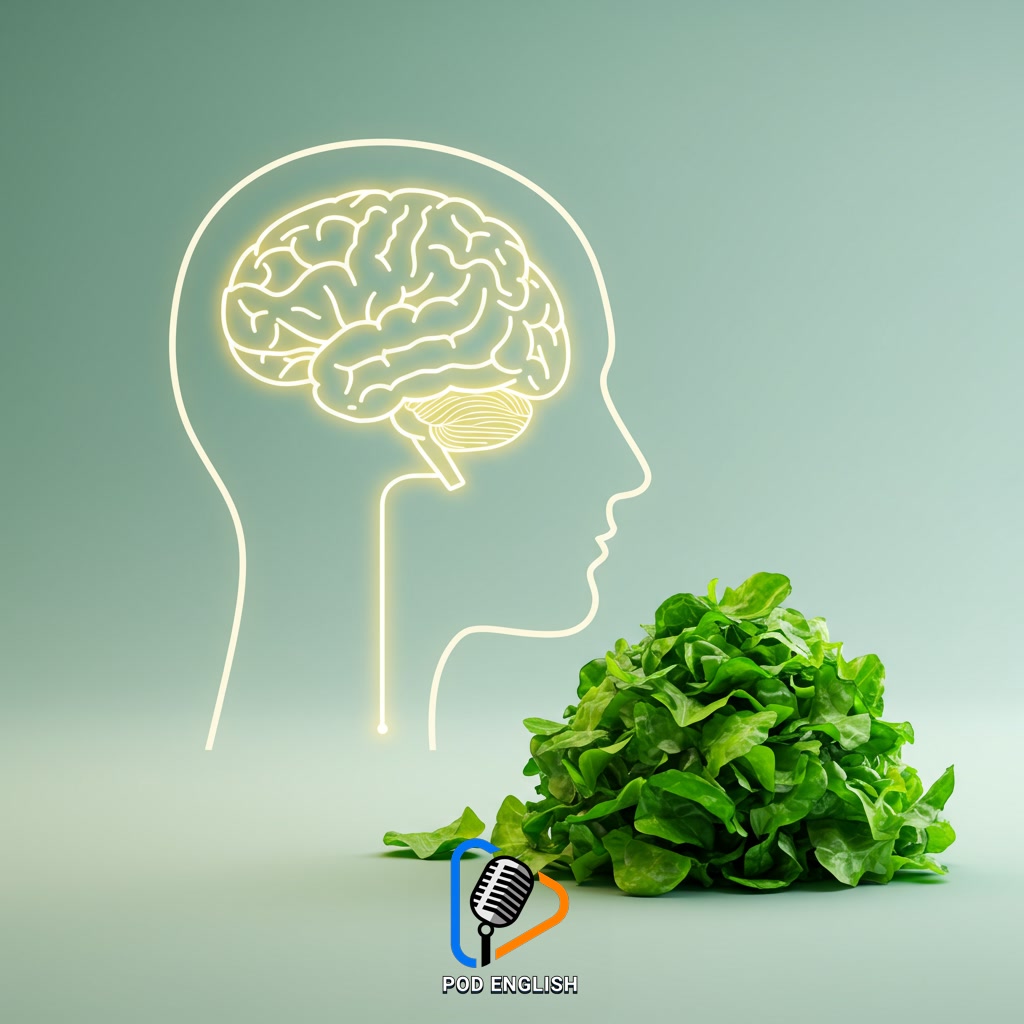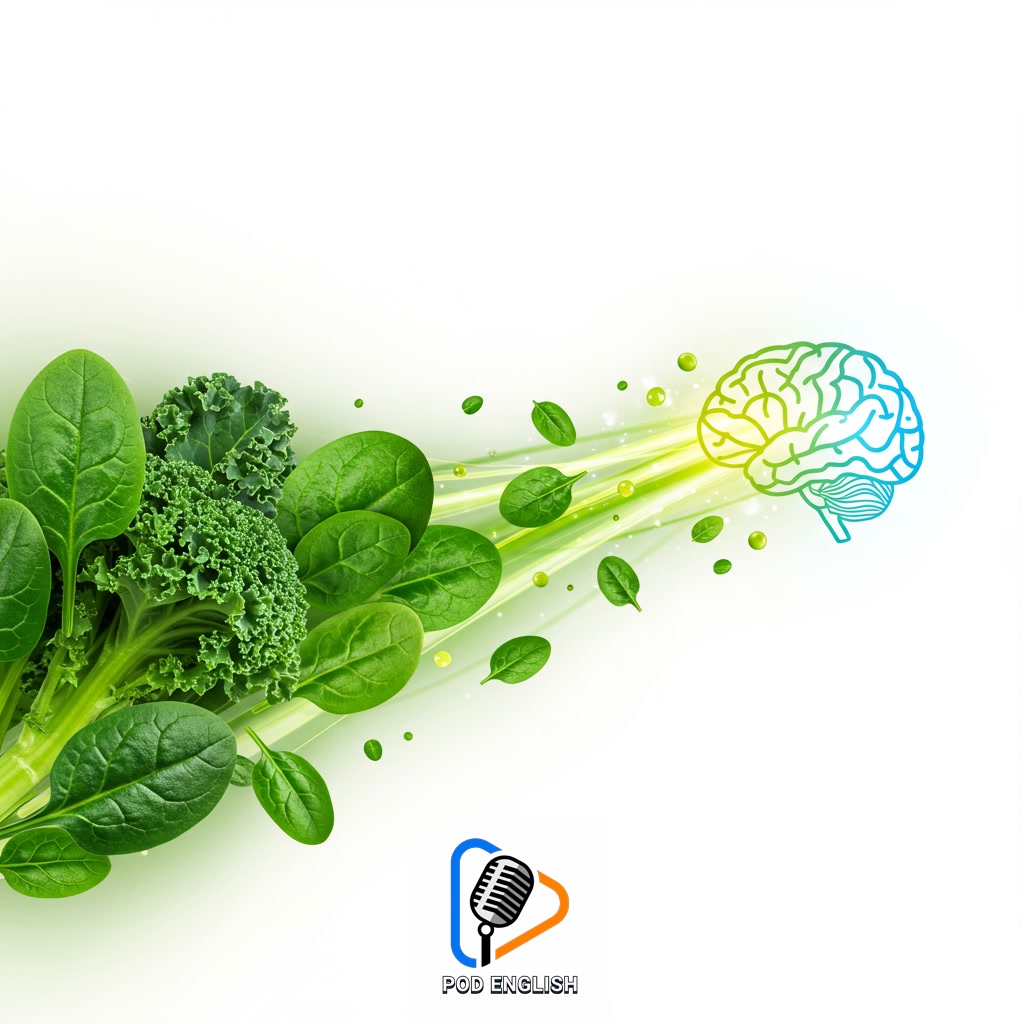Learn English
Leafy Greens: Power Your Brain for English Learning
Explore how incorporating leafy greens into your diet can enhance brain function. Discover the specific nutrients in these vegetables that support cognitive health. Understand how improved brain power can positively impact your efforts in learning English. This content highlights the link between nutrition and effective language acquisition.
Table of Contents
- Section 1: Introduction: The Brain-Diet Connection and English Learning
- Section 2: Why Leafy Greens? Key Nutrients for Brain Health
- Section 3: Boosting Cognitive Functions: How Leafy Greens Support Memory and Focus
- Section 4: Powering Your English Learning: Linking Brain Health to Language Acquisition
- Section 5: Making it Practical: Easy Ways to Incorporate Leafy Greens into Your Diet
- Section 6: Conclusion: Eat Your Greens, Learn English Better
Section 1: Introduction: The Brain-Diet Connection and English Learning
Welcome to ‘Leafy Greens: Power Your Brain for English Learning’. This guide explores a fascinating connection: how what you eat, specifically leafy green vegetables, can significantly impact your brain’s ability to learn and process information. Learning English is a rewarding journey, and it requires strong cognitive function, including memory, focus, and comprehension. Many people don’t realize that the nutrients we consume play a vital role in supporting these brain processes. In this first section, we introduce the fundamental concept of the brain-diet connection and set the stage for understanding how simple dietary choices, like adding more spinach or kale to your meals, can become a powerful tool in enhancing your English learning capabilities. Let’s discover how fueling your brain with the right nutrients can make your language acquisition efforts more effective and enjoyable.

Section 2: Why Leafy Greens? Key Nutrients for Brain Health
Leafy greens are nutritional powerhouses specifically beneficial for brain health. They are rich sources of key nutrients like folate (Vitamin B9), which is crucial for nerve function and cognitive performance, and Vitamin K, associated with improved memory and brain cell health. Additionally, these vegetables contain potent antioxidants such as lutein and zeaxanthin, which help protect brain cells from oxidative stress and inflammation, contributing to sharper focus and better information processing. By providing your brain with these vital components, incorporating leafy greens into your diet creates a stronger, healthier foundation, making it easier to concentrate, remember new vocabulary, and ultimately enhance your English learning journey.

Section 3: Boosting Cognitive Functions: How Leafy Greens Support Memory and Focus
Building upon the crucial role of folate, leafy greens offer a wealth of additional nutrients vital for cognitive enhancement. These vegetables are rich in antioxidants such as lutein and zeaxanthin, which help protect brain cells from oxidative stress, contributing to better long-term brain health. Vitamin K, also abundant in leafy greens, is linked to improved memory function. By incorporating these greens into your diet, you can support the neural pathways responsible for memory recall and strengthen your ability to maintain focus during complex tasks. This nutritional support directly benefits English learners by making it easier to remember new vocabulary and grammar rules, and to concentrate effectively during study sessions or language practice.

Section 4: Powering Your English Learning: Linking Brain Health to Language Acquisition
The enhanced cognitive function derived from the nutrients in leafy greens, such as improved memory retention and heightened focus, directly supports the complex process of language acquisition. When your brain is well-nourished, it becomes more efficient at processing new information, recalling vocabulary, understanding grammatical structures, and maintaining concentration during study sessions. This means that incorporating these powerful vegetables into your diet can literally ‘power’ your English learning efforts, making it easier to absorb, practice, and retain the skills necessary for fluency. By optimizing brain health, you are creating a stronger foundation for effective and enjoyable language learning.

Section 5: Making it Practical: Easy Ways to Incorporate Leafy Greens into Your Diet
Now that you understand how leafy greens can power your brain for better English learning, let’s make adding them to your diet simple and practical. You don’t need to become a gourmet chef! Easy ways include tossing a handful of spinach or kale into your morning smoothie – often, you won’t even taste it. Add mixed greens to sandwiches, wraps, or use them as a base for quick salads. Stir chopped greens into soups, stews, or pasta sauces during the last few minutes of cooking. Even simple sides like sautéed greens with garlic are fast and nutritious. By incorporating these versatile vegetables into your daily routine effortlessly, you ensure your brain gets the consistent nutritional support it needs for improved focus, memory, and overall cognitive function essential for mastering English.

Section 6: Conclusion: Eat Your Greens, Learn English Better
In conclusion, making leafy greens a regular part of your diet is a simple yet powerful strategy to support your English learning journey. As we’ve explored, the vitamins and nutrients in these vegetables significantly boost brain functions like memory, focus, and concentration. When your brain is well-nourished and performing optimally, you’ll find it easier to absorb new vocabulary, understand grammar rules, and practice speaking with greater clarity. Eating your greens isn’t just about physical health; it’s an investment in your cognitive power, directly enhancing your ability to learn and master English. So, remember this easy step: fuel your brain with greens and watch your English skills flourish.














